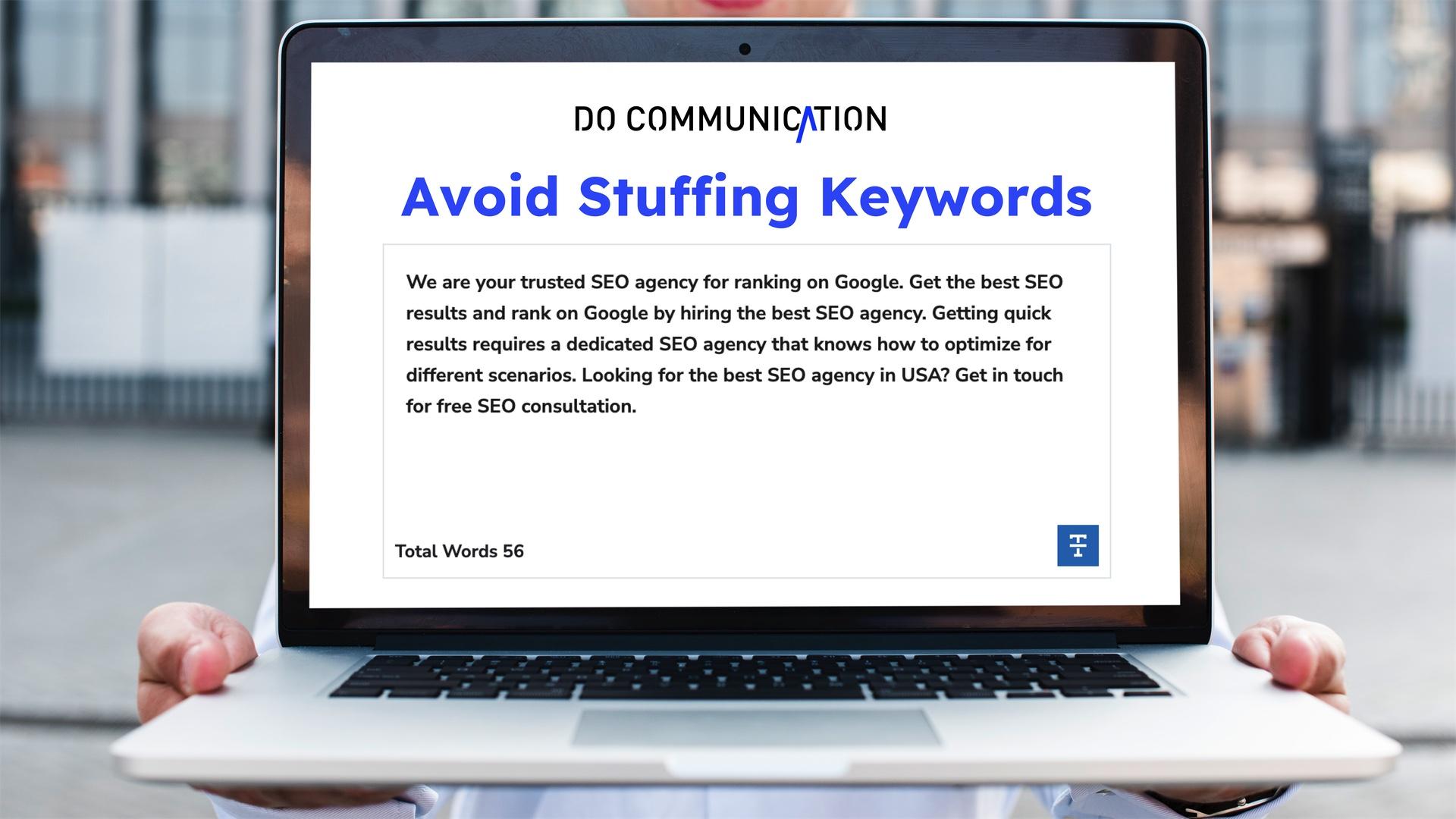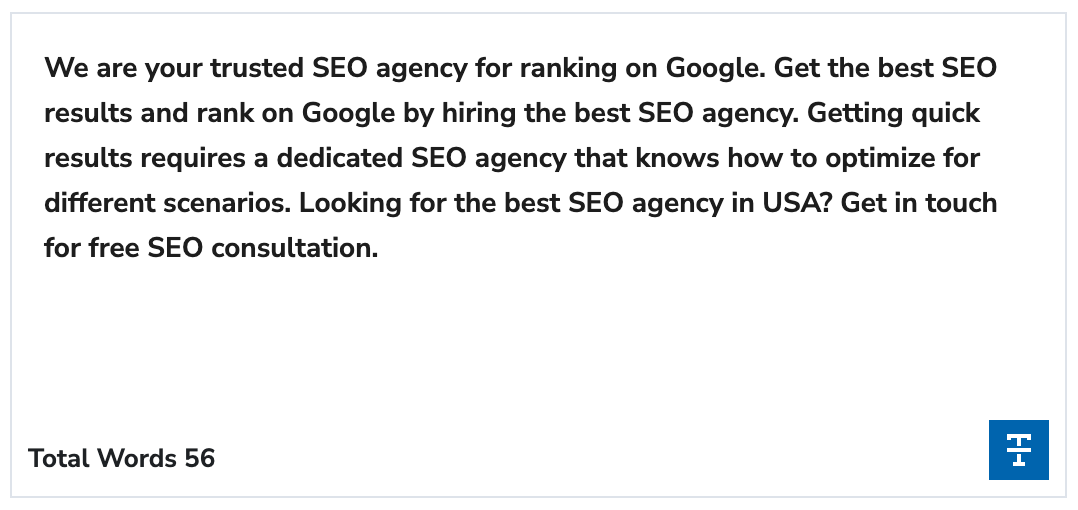There used to be a time when you could write an entire blog made up of the same five lines, paraphrased in ten different ways and probably rank at the top of the search pyramid. No more.
Google and other search engine platforms quickly caught up to these keyword spamming exercises and brought steep penalties for the offenders. Modern SEO practices are rooted in quality content creation and optimizing for the user experience. Yet, some website owners unwittingly get trapped by self-defined SEO experts and end up getting penalized for keyword stuffing.
Table of Contents |

In this post, we have a look at the effects of keyword stuffing on your website ranking, your content, and your user experience.
What are keywords?
Keywords in SEO (Search Engine Optimization) are specific words and phrases that describe the content of a webpage and what it is about. They are the terms that users enter into search engines when looking for information, products, or services. Using relevant keywords effectively helps search engines understand the content of your webpage and determine how it should be indexed and ranked.
SEO works by working on a set of Core Keywords and a matching set of related keywords. For example, a core keyword for our clients, which is a global tyre manufacturer, would be “premium car tyres”, for which the auxiliary keywords can be “premium car tyre price” or “premium car tyres for Volkswagen Polo”.
Now, we can create a comparison blog, highlighting the various features of our tyre brand against several competing brands, and leave the user to assess the case and make their own conclusions. Or, we can resort to keyword stuffing.
What is keyword stuffing?
Imagine writing a blog about “The Best Car Tyres for Compact Hatchbacks in 2024”. Now, according to the EEAT standards, we should be writing an unbiased review of tyres and providing relevant images and inserting internal and external links leading to tyre prices and reviews and stuff, while also targeting our keywords. But that would require a lot of creative thought, costly content creation, and investing on premium images. So, what if?
Instead of doing all that, we write a blog that speaks about our brand is the best, with a ton of keywords like car tyres for hatchbacks, check hatchback car tyre price, best deals on car tyres, and so on. It will cover all keywords, wouldn’t require much effort, and we can easily rank, right?
Well, no.
As we said at the beginning, it does not work that way anymore.
Keyword stuffing is an unethical search engine optimization (SEO) technique in which a web page is loaded with keywords or numbers in an attempt to manipulate a site's ranking in Google's search results. These keywords often appear in a list or group, or out of context (not as natural prose).
How Keyword Stuffing affects your ranking?
While earlier a keyword spamming technique would only result in a de-ranking of your website, nowadays the search engines can penalize your website for longer terms.
Google can penalize websites that engage in keyword stuffing by lowering their search rankings or even removing them from search results altogether. The goal of SEO is to provide users with the most relevant and high-quality content, and keyword stuffing is contrary to this objective.
We have seen client websites which were overstuffed with keywords to the level of making the content incoherent. Bringing these websites back from search engine ignominy requires a lot of time (months or even years), because they have been identified as a spam domain by search engines.
How Keyword Stuffing Affects Your content?
Content that is obviously keyword-stuffed appears spammy and untrustworthy to users. This can harm the credibility of your website and brand. By focusing on keyword stuffing, you also miss out on the opportunity to address the needs and questions of your audience. And granted that you have invested time, effort, and money in generating that content, and now it’s penalized, you end up in a lose-lose situation.
How Keyword Stuffing Affects User Experience?
Overloading content with keywords makes it difficult to read and understand. Users too can identify such content at a glance and tend to leave the page as quickly as they arrived. This increases your bounce rates and sends a signal to the search engines that the page is not worth a visit.
Moreover, even if the user stays and tries to navigate through the page in search of some useful tidbit, the unnatural content flow results in certain disengagement.
Ultimately, this affects your EEAT standard and also results in fewer shares, backlinks, and diminished search engine optimization levels.
Checking your content for Keyword Stuffing
If you have been relying on an external agency or freelancer for content generation, it’s imperative that you glance through every content piece you are billed for. You can also use free tools like the Keyword Density Checker by Small SEO Tools to check the number of keywords and their respective repetitions. For your information, here’s a keyword density check of this blog till now.

We are about 845 words in, and the word “keyword stuffing” has appeared 13 times. Which means the keyword density is 1.65%. The SEO experts at DO COMMUNICATION recommend a keyword density of 1-2% so we are well within the prescribed range.
Now what would a keyword stuffed content look like?
Example of Keyword Stuffing
We wrote a custom paragraph just for the sake of demonstration, check the screen grab below:

As much as it assaults your senses, the keyword densities for the terms SEO and SEO Agency are 10% and 7% respectively.
How to avoid Keyword Stuffing?
If you have been advised to stuff keywords by someone, the first thing is to block them and start afresh. You may also want to check your website for other unethical SEO practices that were unknowingly implemented. Here’s a link to Google’s Spam Policies for Web Search, to check whether you have been transgressing any other rules.
Next up, hire a good content writer or a creative agency or an SEO agency for that matter to sort things out for you. Where an independent content creator can help out in editing your old content, a content writing agency will have the resources to revamp existing content and create new content simultaneously. The decision is yours based on the scope and of course the budget.
Make sure that your new team follows the SEO best practices when creating content.
- Focus on Quality: Create high-quality, informative, and engaging content that provides value to your readers.
- Natural Integration: Use keywords naturally within the context of the content.
- Keyword Variety: Use a variety of related keywords and phrases to cover different aspects of the topic.
- User Intent: Align your content with the search intent of your audience.
- Optimize Other Elements: Include keywords in meta tags, headings, and image alt text, but in a way that makes sense and adds value.
Perchance you engage an SEO agency, they can help you with content creation and more, as they will also have on-page and off-page specialists who can identify other search optimization issues with your website and create an extensive plan for ranking recovery.
Read More - Comprehensive Guide: How to Rank in Google's SGE


